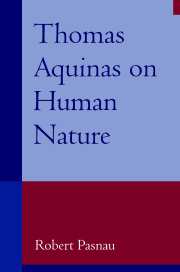Book contents
- Frontmatter
- Contents
- List of Abbreviations
- Acknowledgments
- A Note to the Reader
- Introduction
- PART I ESSENTIAL FEATURES (QQ75–76)
- PART II CAPACITIES (QQ77–83)
- 5 The soul and its capacities
- 6 Sensation
- 7 Desire and freedom
- 8 Will and temptation
- PART III FUNCTIONS (QQ84–89)
- Epilogue: Why Did God Make Me?
- Notes
- Bibliography
- Appendix: Outline of the Treatise (ST 1a 75–89)
- Index
6 - Sensation
Published online by Cambridge University Press: 05 June 2012
- Frontmatter
- Contents
- List of Abbreviations
- Acknowledgments
- A Note to the Reader
- Introduction
- PART I ESSENTIAL FEATURES (QQ75–76)
- PART II CAPACITIES (QQ77–83)
- 5 The soul and its capacities
- 6 Sensation
- 7 Desire and freedom
- 8 Will and temptation
- PART III FUNCTIONS (QQ84–89)
- Epilogue: Why Did God Make Me?
- Notes
- Bibliography
- Appendix: Outline of the Treatise (ST 1a 75–89)
- Index
Summary
Aquinas's treatment of the senses is brief but interesting (§6.1). The senses, on his account, were designed by nature to detect certain features of the environment. In analyzing the senses he makes teleological assumptions, but not necessarily ones that we would find unacceptable (§6.2). His account begins with the objects of sensation and works toward a characterization of the capacities on which these objects make an impression. The function of the five external senses is defined in terms of the sensible qualities that they perceive: white, sweet, and so on (§6.3). But because animals need to do more than discriminate between different colors or different flavors, there must be further, internal sensory capacities, including a common sense that makes comparative and second-order judgments, but does not account for consciousness (§6.4).
Does Aquinas have a theory of sensation?
A cursory inspection of the Treatise reveals that Aquinas does not think it very important to consider the senses. These topics are covered in the space of two articles (78.3–4), only the first of which is devoted to what we count as the senses – namely, the five external senses (78.3). Even the seemingly uninteresting powers of the nutritive soul (the powers for nutrition, growth, and reproduction) receive an article's worth of attention (in 78.2). In contrast, the appetitive powers are the subject of four whole questions (QQ80–83), and the intellective capacity is the subject of the thirteen articles of Q79. Moreover, when Aquinas turns to the soul's operations, his entire attention turns out to be focused on the intellective and appetitive capacities. All of QQ84–89 is dedicated to the operations of intellect.
- Type
- Chapter
- Information
- Thomas Aquinas on Human NatureA Philosophical Study of Summa Theologiae, 1a 75-89, pp. 171 - 199Publisher: Cambridge University PressPrint publication year: 2001



